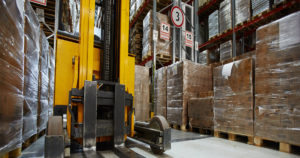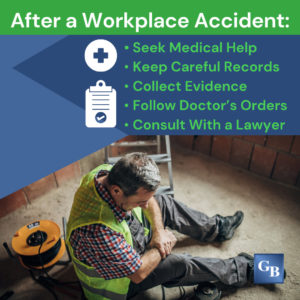What Types of Injuries are Caused by Machinery Accidents?
January 6, 2021 Construction sites, busy warehouses, manufacturing plants, and metalworking plants are just a few examples of industries that require workers to use a range of tools and machinery in order to do their jobs. From table saws and nail guns to forklifts and compactors, these machines help workers complete a range of tasks more quickly, efficiently, and safely when used properly. However, if employees are not properly trained, fail to follow the necessary safety precautions, or the machine malfunctions, it can cause devastating injuries. In extreme cases, the injuries can be fatal. If a worker is seriously injured in a workplace machinery accident, an experienced Workers’ Compensation attorney can assist the injured worker with the claims process and address all of his or her questions and concerns.
Construction sites, busy warehouses, manufacturing plants, and metalworking plants are just a few examples of industries that require workers to use a range of tools and machinery in order to do their jobs. From table saws and nail guns to forklifts and compactors, these machines help workers complete a range of tasks more quickly, efficiently, and safely when used properly. However, if employees are not properly trained, fail to follow the necessary safety precautions, or the machine malfunctions, it can cause devastating injuries. In extreme cases, the injuries can be fatal. If a worker is seriously injured in a workplace machinery accident, an experienced Workers’ Compensation attorney can assist the injured worker with the claims process and address all of his or her questions and concerns.
According to the Occupational Safety and Health Administration (OSHA) and the Bureau of Labor Statistics, machinery accidents are responsible for over 800 fatalities and approximately 18,000 amputations, crushing injuries, lacerations, and abrasions each year in the United States. Employers have a responsibility to provide a safe work environment, which includes ensuring that all machinery is working properly and that any necessary repairs are made as soon as possible. In addition, workers must be trained on how to use the machinery and the safety protocols that must be followed. One small oversight or failure to make safety a top priority can have tragic consequences.
What are the Most Common Types of Heavy Machinery Accidents?
When large pieces of machinery are used in the workplace, even a small oversight or mistake can cause a serious accident. These accidents can include a range of tools and machinery, including loaders, cranes, backhoes, compactors, mixers, forklifts, haul trucks, and cable plows. The following are examples of the most common workplace accidents involving heavy machinery:
- Getting pinned by heavy machinery
- Getting caught between vehicles backing up
- Falling when getting on or off of a piece of machinery
- Getting struck by a piece of machinery
- Being pinned by a piece of heavy equipment
- Getting crushed under a collapsing structure
- Slipping or falling into unguarded machinery
- Mention amputations, crushing injuries, etc. from unguarded / poorly designed machines
What Types of Injuries are Caused by Heavy Machinery Accidents?
Depending on the piece of machinery that is being used, it can cause a range of injuries, from minor cuts and bruises to severe, life-threatening injuries and fatalities. Many of these injuries can be prevented if workers and employers make safety a top priority at all times. However, even when workers follow safety protocols, there are times when the machinery is defective or fails to work properly. The following are examples of common injuries caused by heavy machinery accidents:
- Cuts and lacerations
- Broken bones
- Crushed hands, fingers, or limbs
- Concussions
- Electrical burns
- Internal hemorrhaging
- Organ damage
- Permanent nerve damage
- Paralysis
- Amputations
- Wrongful death
In addition to devastating physical injuries, victims of workplace machinery accidents often face astronomical medical expenses, lost wages, and mental and emotional trauma.
How can Heavy Machinery Accidents be Prevented?
When it comes to preventing any type of workplace accident, common sense goes a long way. Employers must provide the necessary training and personal protective equipment (PPE), and employees must follow the safety protocols and use the recommended PPE based on the equipment they are using. In addition, employers are urged to take the following steps to prevent workplace injuries involving heavy machinery:
- Keep all PPE well-maintained: In addition to ensuring that the appropriate PPE is available and used by all employees, employers must ensure that it is in good condition. PPE, such as helmets, gloves, boots, and goggles that are old, dirty, or broken are less likely to effectively protect the worker from hazards associated with heavy machinery. PPE that is no longer effective must be repaired or replaced immediately.
- Workstations should be kept clean: If there are spills, hazards, or other environmental issues that could jeopardize the safety of the workstation, these should be cleaned up as soon as possible. Maintaining a clean and orderly workstation can prevent accidents and may encourage other workers to do so as well.
- Make sure that the appropriate safety guards and sensors are used: When using heavy equipment, understanding how the safety guards and sensors work, and using them correctly, is just as important as operating the machinery. All pieces of heavy machinery have safety guards that are meant to prevent serious accidents. Employers must inspect the machinery on a regular basis and make the necessary repairs or replacements. Older equipment should be updated with the appropriate safety systems or replaced with newer equipment.
- Provide safety training: Employers have a responsibility to ensure that all workers are trained and understand the safety protocols for the equipment they are using. This should include everything from the appropriate PPE they should be using to the correct way to turn on, operate, and turn off the machinery. Employees should not be permitted to use the machinery until they have completed the necessary training. If new and improved training methods and technology have been established, employers must update their training programs.
- Document all safety issues: Employers are urged to keep detailed safety logs about machines that have been serviced, and information about accidents and workplace injuries. This information can be used to help employers take the necessary safety precautions to prevent these events from occurring in the future.
The following are best practices that employees can follow to avoid serious injuries caused by heavy machinery accidents:
- Use the appropriate machine guards to protect workers from debris that can strike workers while the machine is in use.
- Wear the necessary PPE for the machine that is being used, including goggles, ear plugs, face shields, gloves, and/or hard hats. A failure to wear the safety gear required for a specific type of heavy machinery can increase the risk of a serious injury.
- Only use machinery after being properly trained. All workers must be trained on how to properly turn on, operate, and turn off any tool or piece of heavy machinery that they are responsible for operating. In some cases, workers must obtain specific licensure, or receive hands-on training before he or she can be allowed to use a piece of heavy equipment. Failure to complete the required training can lead to serious injuries.
- Always confirm that the machine is powered off and secured against hazardous motion before proceeding with any maintenance or repairs.
- Consider the energy hazards that may be associated with the machine, including electrical, mechanical, pneumatic, or hydraulic.
- Use individual locks and tags when locking and tagging out equipment. Employees should not remove locks that do not belong to them.
- Always inspect machinery before using it. Machinery that needs to be repaired must be tagged and removed from service.
- Do not interfere with machinery that is moving. Machine workers can get distracted, and if another worker gets too close to the machine that is being operated, he or she can be struck by the moving parts.
What Should I Do if I am Injured in a Heavy Machinery Accident?
When an employee is injured on the job, he or she must notify his or her employer about the injury and fill out the necessary paperwork in order to initiate the claims process. Injuries caused by heavy machinery can be quite severe, resulting in costly medical bills and loss of income if the employee is unable to return to work for an extended period of time. Workers’ Compensation benefits provide for the following:
- Medical expenses
- Lost wages
- Rehabilitation expenses
- Disability benefits
In some cases, the injury may be caused by a machine that was defective or malfunctioned. If this is the case, the injured worker may be able to file a third-party lawsuit against the product manufacturer. An injured worker may be eligible to receive the following:
- Medical bills
- Lost wages
- Future medical bills
- Pain and suffering
- Loss of consortium
- Loss of enjoyment of life
A skilled Workers’ Compensation attorney can review the details of the case, as well as the nature of the injuries, and recommend the best legal course of action.
Philadelphia Workers’ Compensation Attorneys at Galfand Berger LLP Represent Victims of Heavy Machinery Accidents
If you or a loved one was seriously injured in a workplace accident involving a piece of heavy machinery, do not hesitate to contact the Philadelphia Workers’ Compensation attorneys at Galfand Berger LLP. We understand how devastating these injuries can be. Our dedicated legal team will walk you through every step of the claims process. To schedule a free consultation, call us today at 800-222-8792 or contact us online. With offices in Philadelphia, Bethlehem, Lancaster, and Reading, we serve clients throughout Pennsylvania and New Jersey, including Allentown and Harrisburg.

